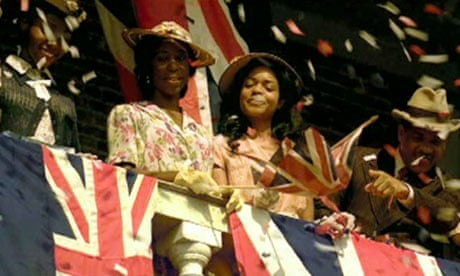Getting the green light for an expensive primetime TV drama, especially one with a largely black cast, has never been easy. That's despite the fact that black audiences, starved of images and (even more so) narratives about themselves, usually come to these shows with a sense of purpose. So all credit to the BBC for allowing an adaptation of Andrea Levy's acclaimed novel Small Island to interrupt the usual Sunday night bonnet-fest. It is a rare opportunity for black audiences to see our lives, histories, challenges, loves and achievements portrayed on the small screen. The first episode inspired my wife, not given to rash impulses, to phone friends and family to remind them it was on BBC1, only to learn (with a smug glow) that they were already watching.
I've been associated with three so-called "black shows" in the UK to date: South of the Border, Deep Secrets and Mike Phillip's provocative Blood Rights. Each programme required a Herculean feat to bring it to the screen. Why? While I've always believed that African-Caribbean stories were, at the very least, equal to those of the other human tribes, the executives on the sixth floor of BBC's Television Centre –and also at ITV, although the BBC is just about the only game in town these days – have traditionally held a different view. As experts on ratings and demographics, they know that bagging a big audience for a 'black' show is a tricky business. They also think, somewhat cynically, that they have the nous to hoodwink their audience.
Some bizarre creative choices in Small Island vividly illustrate this. In a revealing digression from the novel, the production presents us with not one but two heroines – one white, the other black. This is the BBC hedging its bets over the thorny question of whether a primetime audience will track a 'black' story. The former is Queenie, played by the excellent Ruth Wilson, recently arrived in London from a Yorkshire pig farm, with elocution lessons as insurance to ensure she never has to go back up north. Equally desperate to escape her bruising orphaned childhood in rural Jamaica, is Hortence, Naomie Harris' highly-strung schoolteacher, who discovers husband Gilbert, played by the admirably versatile David Oyewolo, living in a grubby room in Queenie's boarding house.
Given more screen time, it is perhaps not surprising that Queenie is the more sympathetically drawn of the pair, and it is her fears and desires we take to heart. In contrast, the portrayal of the newly arrived immigrants, Hortence and Gilbert – facing the biggest challenges of their young lives – is often superficial (check out Gilbert's Stepin Fetchit moments). It seems that Small Island's writing (Paula Milne) and direction (John Alexander) are generally more assured around more familiar white characters and situations – the exception being their portrayal of interracial sex.
Do we need shows that celebrate the arrival, experiences and fairly rapid integration (within 50 years!), of immigrants into modern multicultural Britain? You bet. Andrea Levy can justifiably claim that she provided the BBC with great source material for the task. Small Island seems a missed opportunity. It's about time Auntie stepped up to the plate.

Comments (…)
Sign in or create your Guardian account to join the discussion